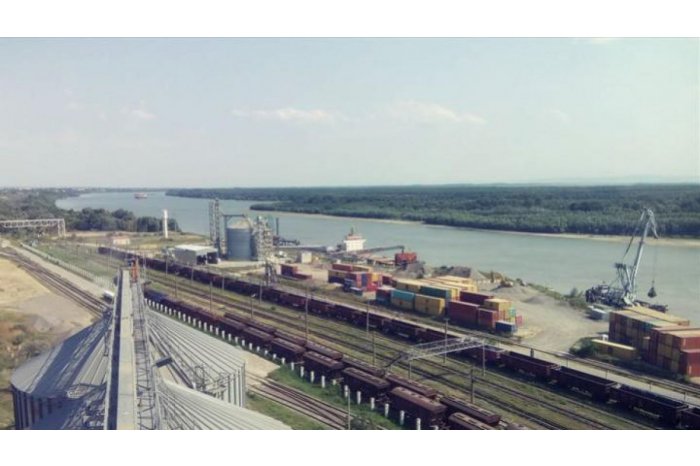
On September 12, 2007 - first oil tank docked in Giurgiulesti
At the confluence of the Danube and Prut rivers, the Republic of Moldova has its only accessible port for large river and sea vessels. The depth of the Danube water reaches 7 meters in this place.
The history of the "acquisition" of the part of the Danube coast by our country is a tangled one and shrouded in mystery. The establishment of administrative boundaries between the Ukrainian SSR and the Moldovan SSR in 1940 was voluntary and dictated by geostrategic and even military reasoning. During the Soviet period, these borders did not have any impact on the existence of these union entities.
After the proclamation of independence in 1991, Moldovans were not concerned with establishing a state border with Ukraine. Moldova was heavily involved in the conflict in its eastern districts and was making desperate efforts to stabilize its political and economic situation.
When the negotiations between the Republic of Moldova and Ukraine started, there were several question marks regarding the affiliation of the territory, called “Râpa de la Mândrești”, to the east of Giurgiulesti, which has an indefinite status. According to the Ukrainian position, it was a Ukrainian territory that could be ceded to the Republic of Moldova in exchange for territories located within the communes of Crocmaz and Palanca. According to international law, however, "Râpa de la Mândrești" was de jure already Moldovan, given that from August 1940 (when the border between the MSSR and the SSR was established) until 1992 (when the Moldovan and Ukrainian prime ministers Valeriu Muravschi met and Pavel Lazarenko), the border crossed to the east of “Râpa de la Mândrești”, which was part of the Giurgiulesti commune.
Following the complicated Moldovan-Ukrainian negotiations, a compromise was reached by signing an additional protocol in 1999 by which the Republic of Moldova will transfer to Ukraine the land included in the Nișaliu river loop located within the commune of Crocmaz (107.7 ha), road sector. Reni-Odessa located within the commune of Palanca with a length of 7.77 km, a width of 23 m and an area of 18 ha, with the corresponding basement, as well as the parts of the communal estate located south of the road, namely Piscicola, Pășunea, Abdiv and Baibol (9.26 km2), forming a total of 10.5 km2, in exchange for a corresponding territory located between the communes of Giurgiulesti in the Republic of Moldova and Reni in Ukraine, territory comprising a portion of the shore along the Danube River ”. Thus, the Republic of Moldova became the owner with proper documents of a segment of 450 meters of Danube coast.
Our country, through the access to the Danube, obtained the possibility to build its first and only port that allows it to obtain the status of Danube and riparian country of the Black Sea.
In 2000, the construction of the port began. In 2006 the works were completed. The port has been granted the status of Free International Port, one similar to the free economic zone.
The port also has a passenger capacity, which is limited to a few hundred people a day.The Giurgiulesti Free International Port benefits from a connection with international trade and transport routes, such as the Rhine-Main-Danube waterway, which connects the Black Sea, 14 European states and the North Sea; European and Russian standard railway systems, as well as the international road network. The services of this port are used annually by companies from over 50 countries, and the Republic of Moldova enters the regional and international maritime-fluvial circuit.
Photo: agora.md
2 July 2014. Moldovan Parliament ratifies Association Agreement with European Union
23 June 1990. Parliament adopts Declaration on Sovereignty of Moldova
4 June 1991. National Bank is set up, a fundamental instrument for Moldova's economic development
Serghei Lazo, legendary name that needs to be rehabilitated
25-31 May 1990. Moldova's parliament approves new concept on government, elects Mircea Druc as prime minister
6 May 1990. The Flowers Bridge - a gate opened to a new world
Ion Suruceanu, archaeologist, curator of European stature
27 April 1990. Moldova's parliament adopts state flag - Tricolour
17 April 1990. First democratically elected parliament of Moldova starts working
7 April 2009. Large, devastating, very strange protest takes place in Chisinau
24 March 2005 - Moldovan parliament adopts Declaration on European Integration of Moldova
Paul Gore, the greatest heraldist and last knight of Bessarabia
11 March 2011 - Joe Biden to Chisinau
Breakaway region in eastern Moldova causes large-scale armed conflict
Superior Council of Magistracy to repeatedly propose to Moldovan president appointment of 17 candidates for judge office
Moldovan energy minister says tariffs did not rise because of domestic decisions, but because Russia used energy as political weapon
PHOTO, VIDEO // Four new judges take oath before Moldova's Superior Council of Magistracy
ARBOM organizes event dedicated to women in Taraclia for second consecutive year
Moldovan president says Council of Europe has vital role to play – not as a neutral observer, but as political guarantor of democratic values, international law
BTA: Bulgarian Community Council Meets in Taraclia, Adopts 2026 Action Plan
Moldovan Central Electoral Commission sets monthly state subsidies for political parties in 2026
VIDEO // Holocaust victims commemorated in Chisinau; Moldovan parliament speaker says lessons of past more relevant than ever in face of hatred, extremism
PHOTO GALLERY // National Holocaust Remembrance rally
Gesture of solidarity with Ukraine: Bishopric of Southern Bessarabia donates mobile hospital to Odesa region
Railway of Moldova state enterprise to have real-time railway infrastructure monitoring center
Parliament speaker meets acting head of OSCE Mission to Moldova
Moldovan president provides clarifications on eventual referendum on unification with Romania
Moldovan PM: “Today we bow our heads before the victims of the Holocaust, but at the same time, we raise our voices for the future”
MOLDPRES INTERVIEW // Moldovan energy minister says foremost interest citizens to have secure energy at affordable prices
Former MP of Moldova sentenced to eight years of imprisonment in file on illicit enrichment, influence peddling

